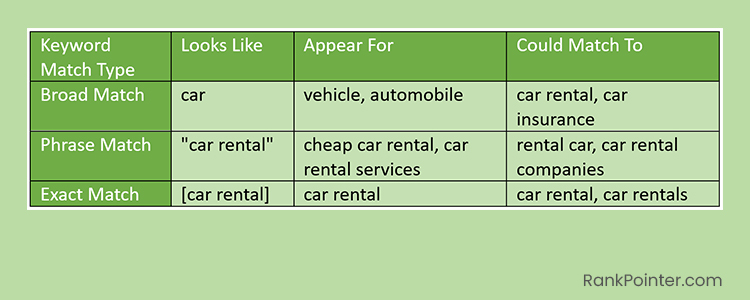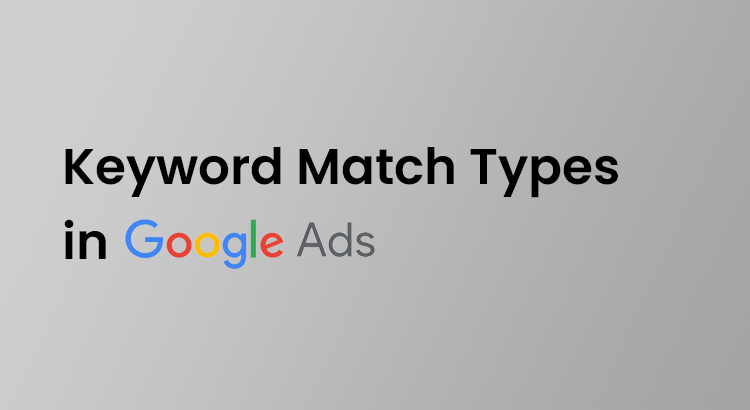Selecting the appropriate keyword match type is crucial for optimizing the performance of your PPC campaigns. Keyword match types in Google Ads determine how closely Google matches user queries to your advertisements, influencing the reach and relevance of your ads. There are three primary keyword match types available:
Google Ads Keyword Match Types
Check out the important keyword types in Google Ads.
1. Broad Match
Broad match is a versatile keyword match type in Google Ads, offering expansive reach and potential exposure to diverse audiences.
Broad match allows your ads to display when users search for related keywords, as determined by Google’s AI. It’s the default match type in Google Ads and doesn’t require any special notation.
Broad match takes into account a variety of relevancy signals, which are:
- Other keywords in your ad group
- User’s previous searches
- User’s location
- Landing page content
Let’s imagine you’re advertising “smartphones.” Your ad might be displayed for the following queries:
- Mobile accessories (Because it’s related to “smartphones” in your ad group)
- Latest tech gadgets (Because it’s topically related to your keyword)
- Apple iPhone (Because your landing page mentions this smartphone brand)
- Buy cell phone (Because the query contains your keyword’s meaning)
- Best smartphone deals (Because the query matches your keyword’s meaning)
This approach widens your ad’s visibility to a broader audience interested in mobile devices, but there’s a possibility of displaying for less relevant searches.
Broad match enables broader exposure to potential customers interested in your products or services. But there’s a risk of displaying ads for less relevant queries, potentially leading to wasted ad spend.
Google suggests using broad match keywords alongside Smart Bidding to optimize for relevant searches aligned with your campaign goals.
Smart Bidding is an AI-driven system that adjusts bids based on expected conversions or conversion value.
You only pay when someone clicks on your ad, regardless of the match type.
When employing broad match keywords, there’s a potential risk of ad poaching. This happens when comparable broad match keywords are present in multiple ad groups, resulting in competition among your ads.
2. Phrase Match
Phrase match indicates that your ads can appear when queries include the essence of your keyword (as determined by Google’s AI).
This type of keyword matching offers a balance between reach and relevance. To specify phrase match keywords in Google Ads, enclose your keyword in quotation marks.
Let’s assume you bid on “car insurance” (with the punctuation included). Your ad could display for queries such as:
- Buy car insurance (because the query contains the essence of your keyword)
- Insurance for new drivers (because the query contains the essence of your keyword)
- Affordable auto insurance (because the query contains the essence of your keyword)
- Coverage for car accidents (because the query matches the essence of your keyword)
However, it shouldn’t appear for more tangential queries like “health insurance” or “car maintenance tips.”
Phrase match keywords are advantageous for brand and competitor campaigns, as they ensure that queries reference your brand name or a competitor’s.
3. Exact Match
Exact match ensures that your ads are displayed only when queries precisely match your keyword’s meaning. To specify exact match keywords in Google Ads, enclose your keyword in square brackets.
Let’s assume you bid on [gaming laptop]. Your ad could appear for queries such as:
- Gaming laptop
- Laptop for gaming
- Best gaming laptop
However, it shouldn’t appear for more tangential queries like “laptop deals” or “gaming desktop.”
Exact match keywords are advantageous when industry regulations dictate advertising on specific terms, ensuring strict alignment with required terms and minimizing irrelevant impressions.
Learn more about keyword matching options

Wrapping Up: Keyword Match Types in Google Ads
Choosing the right keyword match type is important for achieving optimal performance and ROI in Google Ads campaigns. Understanding the nuances of each match type empowers advertisers to tailor their strategies to align with campaign objectives and audience targeting needs.


